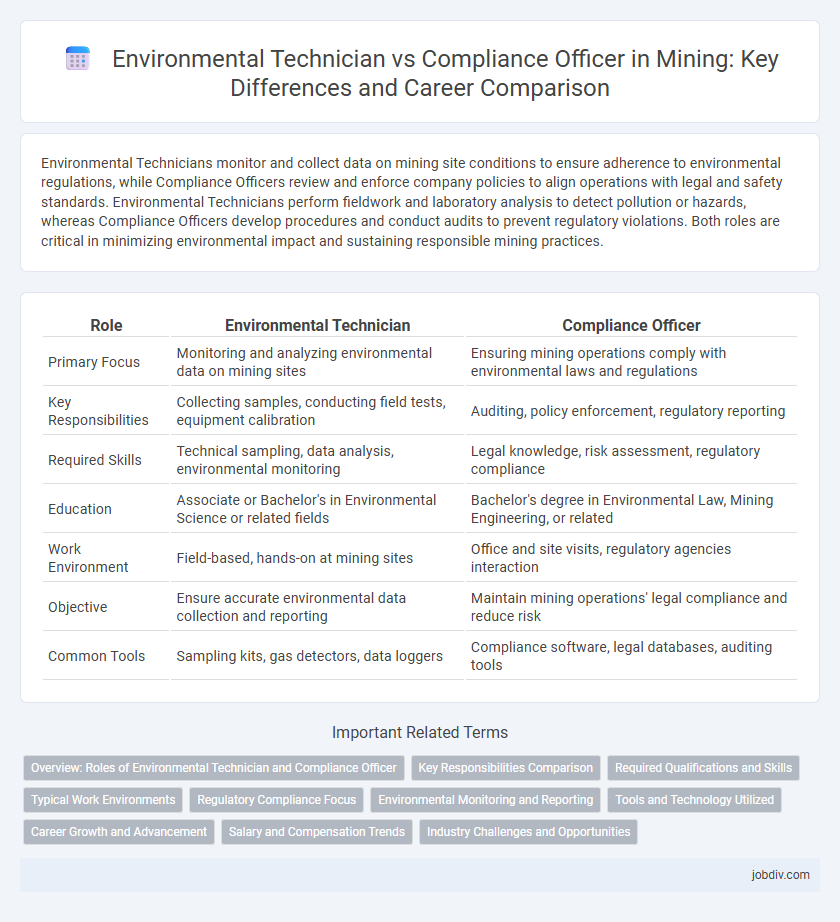Environmental Technicians monitor and collect data on mining site conditions to ensure adherence to environmental regulations, while Compliance Officers review and enforce company policies to align operations with legal and safety standards. Environmental Technicians perform fieldwork and laboratory analysis to detect pollution or hazards, whereas Compliance Officers develop procedures and conduct audits to prevent regulatory violations. Both roles are critical in minimizing environmental impact and sustaining responsible mining practices.
Table of Comparison
| Role | Environmental Technician | Compliance Officer |
|---|---|---|
| Primary Focus | Monitoring and analyzing environmental data on mining sites | Ensuring mining operations comply with environmental laws and regulations |
| Key Responsibilities | Collecting samples, conducting field tests, equipment calibration | Auditing, policy enforcement, regulatory reporting |
| Required Skills | Technical sampling, data analysis, environmental monitoring | Legal knowledge, risk assessment, regulatory compliance |
| Education | Associate or Bachelor's in Environmental Science or related fields | Bachelor's degree in Environmental Law, Mining Engineering, or related |
| Work Environment | Field-based, hands-on at mining sites | Office and site visits, regulatory agencies interaction |
| Objective | Ensure accurate environmental data collection and reporting | Maintain mining operations' legal compliance and reduce risk |
| Common Tools | Sampling kits, gas detectors, data loggers | Compliance software, legal databases, auditing tools |
Overview: Roles of Environmental Technician and Compliance Officer
Environmental Technicians in mining conduct field sampling, monitor environmental conditions, and assist in data collection to ensure site operations meet ecological standards. Compliance Officers oversee regulatory adherence, review environmental policies, and enforce legal requirements to prevent violations and maintain sustainable mining practices. Both roles are crucial for minimizing environmental impact and supporting responsible resource extraction.
Key Responsibilities Comparison
Environmental Technicians in mining collect and analyze soil, water, and air samples to monitor environmental impact, ensuring adherence to environmental standards. Compliance Officers review mining operations to ensure regulatory compliance, conduct audits, and implement corrective actions to meet legal requirements. Both roles collaborate to mitigate environmental risks and promote sustainable mining practices.
Required Qualifications and Skills
Environmental Technicians in mining require a strong foundation in environmental science, proficiency in field sampling, data analysis, and knowledge of pollution control technologies. Compliance Officers need expertise in mining regulations, risk assessment, auditing procedures, and strong communication skills for enforcing environmental laws. Both roles demand attention to detail, problem-solving abilities, and a commitment to sustainable mining practices.
Typical Work Environments
Environmental Technicians in mining typically work onsite at extraction locations, conducting field sampling and monitoring soil, water, and air quality to ensure environmental safety. Compliance Officers often operate within corporate offices or regulatory agencies, reviewing documentation and ensuring mining operations adhere to environmental laws and industry standards. Both roles collaborate closely to maintain sustainable mining practices and prevent environmental violations.
Regulatory Compliance Focus
Environmental Technicians in mining monitor site conditions and collect data to ensure adherence to environmental regulations, directly supporting regulatory compliance through field assessments and reporting. Compliance Officers oversee the implementation of legal requirements and corporate policies, ensuring mining operations align with environmental laws and standards through audits and corrective action plans. Both roles are crucial for maintaining regulatory compliance, with Technicians focusing on data and monitoring, while Officers emphasize enforcement and policy adherence.
Environmental Monitoring and Reporting
Environmental Technicians in mining focus on collecting and analyzing soil, water, and air samples to monitor pollution levels and ensure regulatory adherence. Compliance Officers ensure that mining operations meet environmental laws by reviewing monitoring reports, conducting audits, and enforcing corrective actions. Both roles are critical for maintaining environmental standards and minimizing the ecological impact of mining activities.
Tools and Technology Utilized
Environmental Technicians in mining utilize advanced instruments like water quality testing kits, air sampling devices, and GIS software to monitor and analyze environmental data on-site. Compliance Officers leverage regulatory databases, reporting software, and environmental management systems to ensure mining operations adhere to legal standards and prepare documentation for audits. Both roles increasingly employ remote sensing technologies and real-time data monitoring tools to enhance environmental oversight and regulatory compliance.
Career Growth and Advancement
Environmental Technicians in mining gain hands-on experience with field data collection and environmental monitoring, often advancing into specialist roles or supervisory positions. Compliance Officers focus on regulatory adherence and risk management, positioning themselves for careers in corporate governance or regulatory consulting. Strong knowledge of environmental laws and mining regulations enhances career growth opportunities for both roles.
Salary and Compensation Trends
Environmental Technicians in mining typically earn between $45,000 and $65,000 annually, reflecting entry to mid-level expertise in field sampling and data collection. Compliance Officers command higher salaries, often ranging from $60,000 to $85,000, due to their critical role in regulatory adherence and risk management. Recent compensation trends indicate growing premiums for compliance roles amid increasing environmental regulations and corporate accountability pressures.
Industry Challenges and Opportunities
Environmental Technicians in mining tackle pollution control and environmental monitoring, addressing challenges like groundwater contamination and habitat disruption. Compliance Officers ensure adherence to environmental regulations, managing risks related to regulatory fines and community relations. Both roles create opportunities for sustainable mining practices and innovation in environmental management technologies.
Environmental Technician vs Compliance Officer Infographic

 jobdiv.com
jobdiv.com